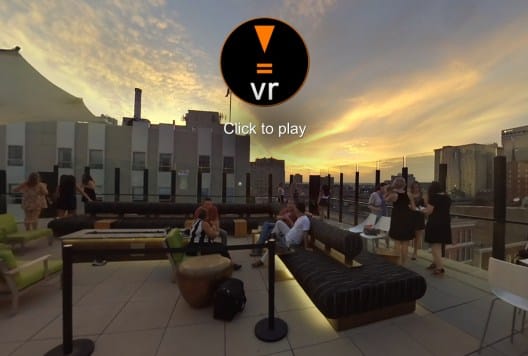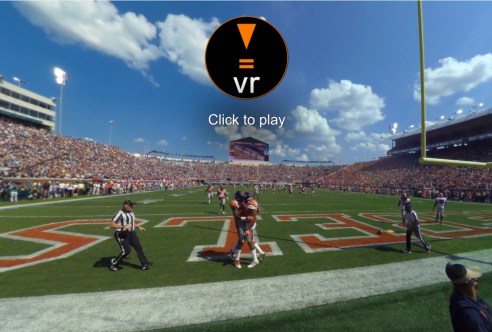Virtual Reality
Videobred adopts 360° media technology
Since its founding in the late 1970s, Videobred has been at the forefront of technological innovation. In the early days, the company seamlessly adapted to each new videotape format. Later Videobred was the first production company in the region to convert to non-linear, 24p and high definition (HD). With each technological advance, the company has offered clients the best solutions for communicating their messages to their customers.
“Right now we’re in the wild, wild west, technologically speaking,” says Videobred owner Jamie Pence. “There are so many options for using virtual reality: Marketing, medicine, training, museums, art, sports and gaming are just a few examples. It’s an ever-evolving technology with ever-evolving uses.”
Because of these boundless opportunities, Pence believes that VR content will become a ubiquitous media tool for both business and consumers.
360° Virtual Reality is The Next Great Wave!
Videobred launched its virtual reality operations in late 2015 after months of research, planning and preparation. Pence himself developed Videobred’s first eight-camera VR rig. Since then he’s added two more VR rigs to the mix. During the first several months of VR creation, the Videobred team honed their virtual reality production and editing skills through repeated acquisition and output.
“We knew VR was different so we continuously experimented with the equipment and software and produced several internal projects before going to market,” says Pence.
Unlike traditional video, VR captures the entire recording environment, including the crew and camera gear. That requires a new approach to how VR projects are conceptualized, pre-produced and produced. Post-production is also more complex: the editor must seamlessly stitch together video from each of the cameras to achieve the 360° effect and paint out the camera rig in Adobe After Effects.
“The VR workflow is entirely different from the process you use for a conventional video,” Pence says. “Intensive preproduction is needed to tell an effective story. Otherwise you’re left with an uninspiring 360° video.”
Uniquely Fresh: Louisville’s Culinary Scene
For its first commercial project, Videobred produced an immersive 360° video for the Louisville Convention and Visitors Bureau (LCVB). The VR production highlights the city’s culinary scene and the farm-to-table approach embraced by many Louisville restaurants. The video provides viewers a great way to experience local farms and the wide variety of restaurants and cuisines available in Louisville.
Shot over two months at multiple locations throughout the city, this VR experience takes the viewer from the food preparation process to the dining experience. In some scenes, images from various restaurants are blended and an arrow guides the viewer through the 360° movement.
“The Videobred team did a great job explaining the VR process and working with us to develop a concept that met our messaging objectives,” says Zack Davis, director of marketing for the Louisville Convention & Visitors Bureau. “The results and reaction to the piece are nothing short of phenomenal.”
Competition to attract new trade shows is fierce and LCVB is using VR to differentiate Louisville’s marketing efforts. The overwhelmingly positive response to the first 360° video prompted LCVB to request two additional VR projects, which are now in production.
Ole Miss Football
The University of Mississippi requested this 360° video to demonstrate the passion and pageantry of Ole Miss football. From tailgating to the locker room to a touchdown romp, this VR piece places viewers in the middle of the action.
Shot in Oxford over two weekends, the Videobred team used five VR rigs to capture the game and behind-the-scenes footage, including a 360° time lapse. The school’s athletic staff provided nearly unlimited access to the football stadium so Videobred could create a unique experience for Ole Miss fans and recruits.
The initial roll out of the video is designed to excite the fan base, however Ole Miss also plans to take advantage of the full immersion of VR by playing the video through the Oculus Rift headset for football recruits during on-campus visits.
“Our goal with VR was to capture the essence of the Ole Miss Football experience,” said Seth Tanner, Producer / Director at Ole Miss. “Not just the game, but the tailgating, the crowd, the locker room, the team marching and then running onto the field. Videobred helped us tell the Ole Miss football story like it’s never been told. In terms of fan engagement, the 360° video produced by Videobred quickly became one of the most shared pieces of content on our social media pages.”
Early Accolades
Videobred’s early VR productions grabbed the attention of Mettle, an industry leading 360° VR tool developer which interviewed Pence and featured the LCVB Culinary 360° video on its website. The Samsung VR website also showcased the culinary video and Videobred picked up the Grand Prize in the culinary category at the 2016 Samsung Creators Awards.
What is Virtual Reality?
Virtual reality is a video-captured or computer-generated 360°, three-dimensional view of a space. Viewers may explore the entire area by using a tablet, smartphone or computer, or they can fully immerse themselves in the environment by using a variety of VR headsets such as the Oculus Rift, HTC Vive, Samsung Gear VR or the soon to be released Playstation VR. Gaming and other creative programs can also incorporate additional gear with sensors such as gloves for even more realistic experiences.
Want to Know More?
We’re a team of creative problem solvers eager to collaborate.
Virtual Reality
Videobred adopts 360° media technology
Since its founding in the late 1970s, Videobred has been at the forefront of technological innovation. In the early days, the company seamlessly adapted to each new videotape format. Later Videobred was the first production company in the region to convert to non-linear, 24p and high definition (HD). With each technological advance, the company has offered clients the best solutions for communicating their messages to their customers.
“Right now we’re in the wild, wild west, technologically speaking,” says Videobred owner Jamie Pence. “There are so many options for using virtual reality: Marketing, medicine, training, museums, art, sports and gaming are just a few examples. It’s an ever-evolving technology with ever-evolving uses.”
Because of these boundless opportunities, Pence believes that VR content will become a ubiquitous media tool for both business and consumers.
360° Virtual Reality is The Next Great Wave!
Videobred launched its virtual reality operations in late 2015 after months of research, planning and preparation. Pence himself developed Videobred’s first eight-camera VR rig. Since then he’s added two more VR rigs to the mix. During the first several months of VR creation, the Videobred team honed their virtual reality production and editing skills through repeated acquisition and output.
“We knew VR was different so we continuously experimented with the equipment and software and produced several internal projects before going to market,” says Pence.
Unlike traditional video, VR captures the entire recording environment, including the crew and camera gear. That requires a new approach to how VR projects are conceptualized, pre-produced and produced. Post-production is also more complex: the editor must seamlessly stitch together video from each of the cameras to achieve the 360° effect and paint out the camera rig in Adobe After Effects.
“The VR workflow is entirely different from the process you use for a conventional video,” Pence says. “Intensive preproduction is needed to tell an effective story. Otherwise you’re left with an uninspiring 360° video.”
Uniquely Fresh: Louisville’s Culinary Scene
For its first commercial project, Videobred produced an immersive 360° video for the Louisville Convention and Visitors Bureau (LCVB). The VR production highlights the city’s culinary scene and the farm-to-table approach embraced by many Louisville restaurants. The video provides viewers a great way to experience local farms and the wide variety of restaurants and cuisines available in Louisville.
Shot over two months at multiple locations throughout the city, this VR experience takes the viewer from the food preparation process to the dining experience. In some scenes, images from various restaurants are blended and an arrow guides the viewer through the 360° movement.
“The Videobred team did a great job explaining the VR process and working with us to develop a concept that met our messaging objectives,” says Zack Davis, director of marketing for the Louisville Convention & Visitors Bureau. “The results and reaction to the piece are nothing short of phenomenal.”
Competition to attract new trade shows is fierce and LCVB is using VR to differentiate Louisville’s marketing efforts. The overwhelmingly positive response to the first 360° video prompted LCVB to request two additional VR projects, which are now in production.
Credits
Ole Miss Football
The University of Mississippi requested this 360° video to demonstrate the passion and pageantry of Ole Miss football. From tailgating to the locker room to a touchdown romp, this VR piece places viewers in the middle of the action.
Shot in Oxford over two weekends, the Videobred team used five VR rigs to capture the game and behind-the-scenes footage, including a 360° time lapse. The school’s athletic staff provided nearly unlimited access to the football stadium so Videobred could create a unique experience for Ole Miss fans and recruits.
The initial roll out of the video is designed to excite the fan base, however Ole Miss also plans to take advantage of the full immersion of VR by playing the video through the Oculus Rift headset for football recruits during on-campus visits.
“Our goal with VR was to capture the essence of the Ole Miss Football experience,” said Seth Tanner, Producer / Director at Ole Miss. “Not just the game, but the tailgating, the crowd, the locker room, the team marching and then running onto the field. Videobred helped us tell the Ole Miss football story like it’s never been told. In terms of fan engagement, the 360° video produced by Videobred quickly became one of the most shared pieces of content on our social media pages.”
Credits
Early Accolades
Videobred’s early VR productions grabbed the attention of Mettle, an industry leading 360° VR tool developer which interviewed Pence and featured the LCVB Culinary 360° video on its website. The Samsung VR website also showcased the culinary video and Videobred picked up the Grand Prize in the culinary category at the 2016 Samsung Creators Awards.
What is Virtual Reality?
Virtual reality is a video-captured or computer-generated 360°, three-dimensional view of a space. Viewers may explore the entire area by using a tablet, smartphone or computer, or they can fully immerse themselves in the environment by using a variety of VR headsets such as the Oculus Rift, HTC Vive, Samsung Gear VR or the soon to be released Playstation VR. Gaming and other creative programs can also incorporate additional gear with sensors such as gloves for even more realistic experiences.
Want to Know More?
We’re a team of creative problem solvers eager to collaborate.


